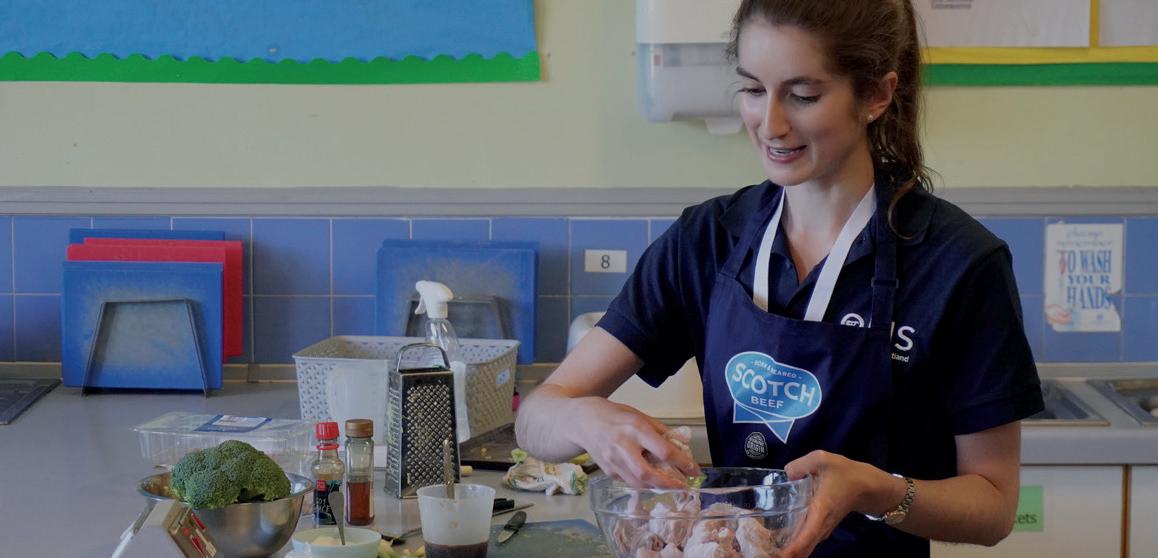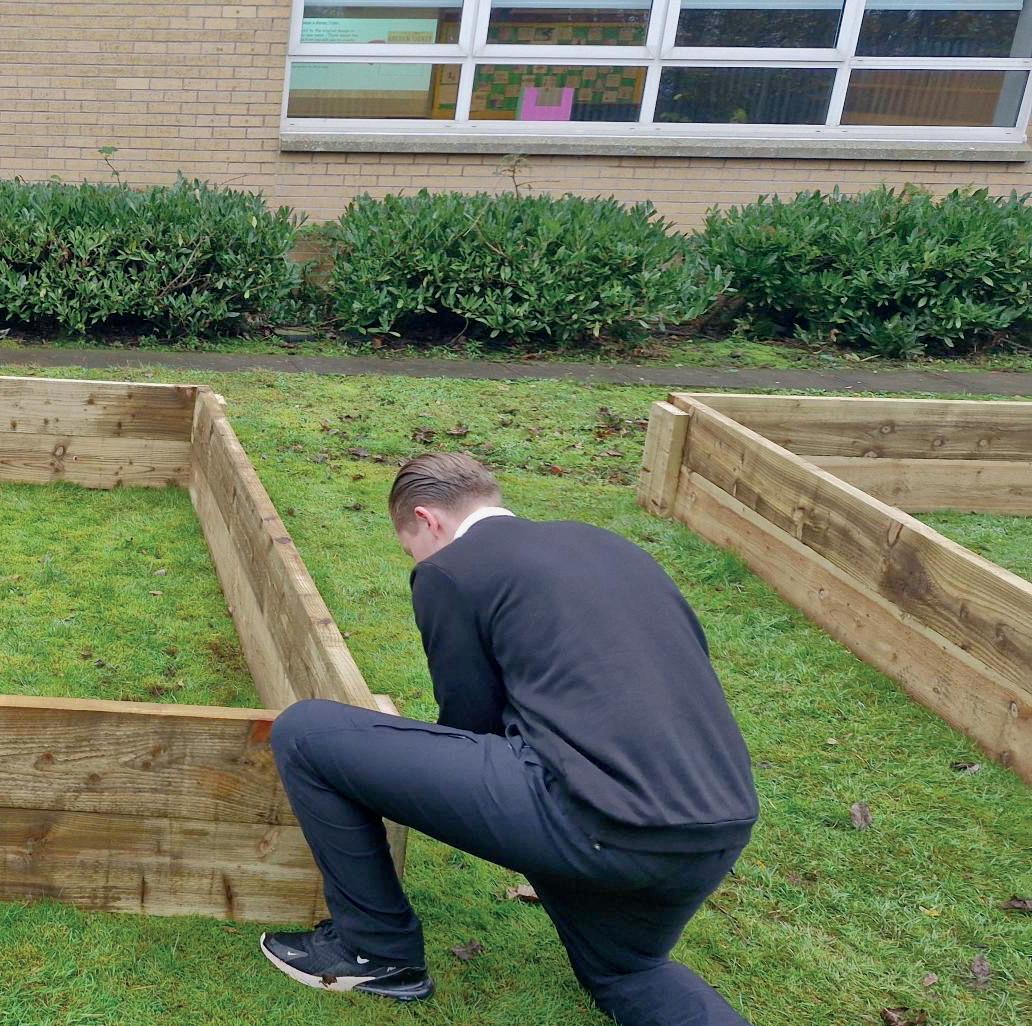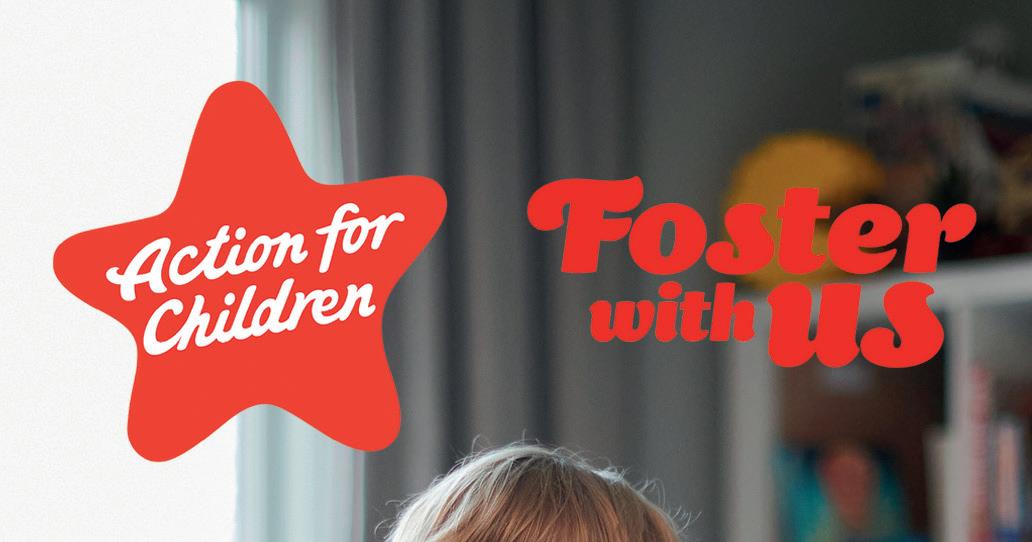













PUBLISHER
Denise Connelly denise@dcpublishing.co.uk
STAFF WRITER
Kate Stevenson
DESIGN AND PRODUCTION
Lucy Baillie lucy.baillie@dcpublishing.co.uk
SALES
Marian Mathieson marian.mathieson@dcpublishing.co.uk
As we approach winter, students are taking the time to re ect on their achievements this year and set goals for the next. Whether they’re getting ready for their exams or planning their next steps, your guidance and encouragement will make all the di erence.
This issue looks at how you can support your students both at home and in school. You’ll nd advice on nurturing study routines, navigating applications, and preparing for the upcoming changes
to UCAS. We also share Aisha Thomas’s advice on creating inclusive classrooms and highlight outdoor learning at a Glasgow school helping pupils build skills and ambition.
Beyond pupil support, we’re focusing on you in this issue by helping you manage your workload, safeguard your wellbeing, and develop your skills through CPD and volunteering. It’s time to invest in your own professional growth.
04 DATES FOR YOUR DIARY
Key dates you won’t want to miss this term.
10 SUPPORTING STUDY AT HOME
Helping families build positive study routines.
12 UCAS CHANGES AHEAD
Big changes to personal statements in 2026 – here’s the update.
14 SUPPORTING APPLICATIONS
Whatever path your students choose, they’ll come to you for advice.
21 FEAR OF FAILURE
Helping students with this pervasive psychological barrier.

©DC Publishing Ltd 2025. All rights reserved. No part of this publication may be reproduced or used in any way without prior written permission from the publisher. The views expressed in this magazine are not necessarily those of DC Publishing Ltd. The publisher takes no responsibility for claims made by advertisers within the publication. Every effort has been made to ensure that information is accurate; while dates and prices are correct at time of going to print, DC Publishing Ltd takes no responsibility for omissions and errors.
www.teachersresource.co.uk
DC Publishing Ltd, 198 Bath Street, Glasgow, G2 4HG Tel: 0844 249 9007 ResourceMagScot
06 CREATING INCLUSIVE CLASSROOMS
Expert advice on making every pupil feel seen and supported.
17 MORE THAN JUST A BOOK
Encouraging reading for pleasure matters now more than ever.
24 LET’S TALK ABOUT BULLYING
Create safe spaces and start open conversations.
26 FINDING THE BALANCE
Your guide to managing your workload and protecting your wellbeing.
28 LEARNING THROUGH VOLUNTEERING
Giving your time can broaden your skills and enrich your teaching.
30 WATCH, LISTEN, TRY
Our recommendations that will inspire, inform, and entertain you.
08 STAYING ON TRACK WITH PROFESSIONAL LEARNING
Keep learning and advancing with CPD opportunities.
18 GROWING FUTURES
A Glasgow school shows how outdoor learning can grow skills and ambition.

BONFIRE NIGHT
Bring history alive with lessons around Guy Fawkes and the Gunpowder Plot.
ANTI-BULLYING WEEK
The 2025 theme is Power for Good – see page 24 for ideas and activities to use in school.
ROAD SAFETY WEEK
Focusing this year on “Safe Vehicles Save Lives”.
ST ANDREW’S DAY
Celebrate Scotland’s national day with cultural activities and traditions. 5 10-14 16–22 30 NOVEMBER termdoubleAlwayscheck

INTERNATIONAL DAY OF PERSONS WITH DISABILITIES
Highlight the importance of accessibility, inclusion and understanding.
Keep students on track with this useful list DECEMBER JANUARY
INTERNATIONAL VOLUNTEER DAY
Celebrate the impact of giving back – turn to page 28 for volunteering ideas.
SCHOOLS CLOSE FOR CHRISTMAS
Time for a well-deserved festive break.
BACK TO SCHOOL
A fresh start to the new term.
3 5 5 14 19
UCAS DEADLINE
This is the cut-o for most Undergraduate and Conservatoire applications.
Bud is our interactive micro-museum that travels across Scotland sharing our archive, veterans’ stories and the history of the poppy. Book Bud free for your school today at poppybud.org.uk


Explore our free, online teaching resources for learners from Early-Senior level. The Classroom resources align with the Scottish Curriculum and many have been developed with some valued partners. Our engaging and dynamic resources are designed to support teachers to explore themes important to Poppyscotland. We have a variety of resources that cover topics such as:
-The history of the poppy
- The poppy as a symbol of remembrance
-VE day
- Life in Britain during WW2
-The Falklands War
-Poetry - In Flanders Fields
-Kindertransport
-Poppy Facts and Myths




Visit Lady Haig’s Poppy Factory in Edinburgh, where all of the poppies in Scotland are made. Find out more about the work of Poppyscotland and learn more about the history of this working factory. Suitable for school groups, smaller groups or individuals. Find out more and register your interest at poppyscotland.org.uk/learning/book-a-visit/factory-tours


Look out for our annual learning pack which includes free resource materials and a competition open to school aged pupils. Enter the competition for a chance to win some fantastic prizes for your school whilst learning about the work of Poppyscotland.
Some of our previous competition themes include:
-My Secret War Diary
-Fundraising Heroes
-The Future of Remembrance
-Letters to my Teacher
Find out more information at poppyscotland org uk/learning


Check out our FREE Fundraising Guide and Poppy Learning Booklet for practical ideas for fundraising and Poppy Learning in your classroom.



Equity consultant Aisha Thomas offers expert insight on creating classrooms where every student is valued, supported, and empowered to succeed


One of the most important buzzwords you’ll hear in any school is ‘inclusion’. It’s in policy documents, curriculum frameworks, and mission statements. But ask students themselves whether they feel included, and the answers can be more complex.
So why is that? Well, simply put, you can’t reduce inclusion to a poster or a special week. It’s not about adding a few diverse texts to the reading list or running an assembly on Black History Month. Instead, it needs to be felt in the everyday rhythm of school life: in the lessons taught, the teachers appointed, the policies enforced, and the way children are listened to.
That is the message Aisha Thomas has spent her career sharing.
As the Founder and Director of Representation Matters Ltd, and one of the rst Black women in Bristol to become an assistant principal, Aisha has made it her mission to help transform school environments. “An inclusive classroom is not just one that celebrates di erence – it’s designed with di erence in mind from the start,” she explains. “It’s a space where all students feel seen, heard, and valued.”
Aisha’s experiences as a student emphasise the importance of this –unfortunately, she went through her entire school life without ever being taught by a Black teacher. It was only when she stepped into the classroom herself as an educator that she realised the power of representation.
But while she understands the value of re ection in education, she also admits it’s not just about who’s in the textbooks or teaching the classes. Inclusion has to be structured from the top. “It cannot be left to individual teachers or occasional assemblies,” insists Aisha. “It needs to be prioritised in strategic decisions, hiring practices, and budget allocations.”
“An inclusive classroom is a space where all students feel seen, heard, and valued”
As you’re reading this, you may be thinking your school already has fair policies. You may be right – but Aisha would urge you to think again.
“To assess whether a policy is truly inclusive, you must start by asking: ‘inclusive for whom?’,” Aisha ponders. Take uniform rules. “Policies around ‘unnatural’ hair colours often come with racial bias,” she says. “I’ve supported Black students who were told that their blonde braids violated policy – but blonde is a natural hair colour. Just because it’s rare in your immediate environment doesn’t mean it doesn’t exist. This is where cultural proximity and implicit bias come into play.” What’s more, punishing those who cannot comply doesn’t just enforce conformity: it sends a signal about which identities are seen as acceptable.
The solution, she believes, is intentionality: conducting Equality Impact Assessments, listening to families, and designing policies that work not just for the majority but for those who are on the margins. She wants schools to use “an intersectional lens” to consider “how race, gender, class, disability, neurodiversity, religion, and other identities overlap to shape a child’s experience.”
Still, even in schools committed to inclusion, racist incidents may occur. It’s how you respond to the occurrences that’s signi cant. “Silence in these moments can be more harmful than the incident itself,” warns Aisha. Her rst priority is always the wellbeing of the student, and making sure they feel protected and believed. Then comes the judgment call: should the student who caused harm be publicly called out, or called in for a more re ective conversation?
Aisha says this decision usually depends “on the severity of what was said or done, the age and understanding of the child who caused harm, and the wider context.” However, “if the comment was said in front of others, I would not let it go unchecked.” Instead, she’d take a moment to address the class, even brie y, to clarify that racism isn’t tolerated and to ensure bystanders understand the gravity of what occurred.
Additional follow-up actions include logging the incident,


contacting families, facilitating restorative dialogue, and o ering aftercare. This is the type of response she wants other teachers to model as well.
While your reactions matter in the moment, long-term change comes from what children are taught every day. Aisha says that Black, Brown, and Indigenous histories are framed only through slavery, colonisation, or oppression. While those stories must be told, they cannot be the whole picture: “Children deserve to see themselves – and others – as whole, complex people,” she adds.
That means teaching about joy, innovation, creativity, and resistance, not just su ering. It might also require you to ask critical questions about your curriculum: who is centred, whose knowledge is valued, and whose voices are missing?
The best way to ensure your curriculum is inclusive is by auditing your resources, diversifying the texts and materials you use, and making it an ongoing e ort.
The last thing that Aisha wants to underline is that inclusion isn’t about ticking boxes or staging themed events. It’s about guaranteeing that no child has to shrink themselves to t in during school hours.
And, according to Aisha, this is down to you: “Creating a classroom where students feel safe doesn’t start in the classroom – it starts with the teacher who walks into it.”
Aisha’s recommended books:
• Becoming an Anti-Racist Educator by Aisha Thomas
• How to Build Your Antiracist Classroom by Orlene Badu
• My Skin, Your Skin by Laura Henry-Allain MBE
Find out more about Aisha’s work at repmatters.co.uk
Planning your CPD for the year ahead? We’ve rounded up a range of accredited options – from STEM and equity to leadership and languages – all designed to fit your busy timetable
Faculty of Humanities & Social Sciences
strath.ac.uk
Strathclyde offers a strong selection of CLPL (Career-Long Professional Learning) courses aimed at teachers looking to enhance classroom practice or take on leadership roles. Current short courses include Inclusive Education, Literacy and Numeracy, Play Pedagogy, and Equity in Practice. Most sessions are delivered online in the evening or at weekends. Enrolment opens in October, with many courses starting in January.
Professional Learning in Secondary Education
dundee.ac.uk
The university offers a wide range of modules including, Digital Assessment and Feedback, Interdisciplinary Learning in the BGE, and Equity and Social Justice in Education. Courses are SCQF level 11 and suitable for classroom teachers and aspiring
leaders. New twilight and flexible options are available, with January start dates and registration now open.
Language CPD for Secondary Teachers scilt.org.uk
SCILT offers free, accredited professional learning opportunities to support language teaching across Scotland. Options include online signpost sessions on multilingual classrooms and curriculum planning, and Scotland’s Languages Leadership Programme, which is GTCS-recognised. New session dates are available now.
(GTCS)
Professional Update & Accredited Programmes gtcs.org.uk
The GTCS database of accredited professional learning programmes is your go-to for high-quality,
recognised CPD. New additions include programmes in STEM pedagogy, developing racial literacy in school communities, and embedding sustainability into the curriculum. Each listing notes whether the course carries Professional Recognition (PR) status.
National e-Learning Offer & Leadership Pathways education.gov.scot/professionallearning
Education Scotland supports teachers with curated online CPD and national leadership programmes. Options for 2025/26 include Aspiring to Middle Leadership, Into Headship, and Connected and Collaborative Systems Leadership. The Inclusion, Wellbeing and Equalities Framework also supports whole-school professional learning. Applications for leadership pathways open in the autumn.
Use the GTCS course search at gtcs.org.uk to check accreditation.

Would you like to help your school community learn more about where their food comes from? At Quality Meat Scotland (QMS) we offer engagement in a variety of ways, all designed to help young people learn more about the Scottish red meat sector.
Classroom sessions linked to Curriculum for Excellence, with a variety of engaging activities designed to meet subject benchmarks.
Our QMS Scotch Ambassadors can help your young people to explore cooking with Scotch red meat and learn how to easily include it in a healthy, balanced diet.
Nutrition focused sessions with coaching session built-in, designed to help young people learn how diet can enhance performance and recovery in sport, linking learning across the curriculum.




Scan here to explore the six lessons on our online interdisciplinary-learning platform ‘Farming Foodsteps’ – covering everything from farm to fork!
Want to have a chat with us?
Contact Abby Goldie, Community Engagement Coordinator agoldie@qmscotland.co.uk
Helping pupils develop effective study habits is part of everyday teaching –but many parents still feel unsure how to support their child at home. Some lack confidence, others don’t know where to start. A bit of reassurance and the right tools can go a long way.
Short study sessions with breaks are more effective than cramming. A quiet space, good lighting and fewer distractions – such as phones or background noise – help pupils focus. Parents don’t need to know the subject content to be useful. Showing interest, helping their child stick to a routine and encouraging rest makes a big difference. You can also recommend websites
that explain things clearly. BBC Bitesize (bbc.co.uk/bitesize) has study content for every subject and level. Seneca Learning (senecalearning.com) offers free revision courses, with the option for parents to keep an eye on progress. It helps if families know what their child is working towards. Whether it’s National 4s, National 5s, Highers or Advanced Highers, encourage parents to ask what’s coming up. Pupils can talk through their deadlines or revision plans – this can make things feel less overwhelming.
Every pupil studies differently, and every home is different too. Some use flashcards or mind maps, others prefer to talk things through. Let families know it’s fine to try out different methods until something works.
A calendar or wall planner helps

Helping families build strong study habits together
pupils keep track of what’s been covered and what’s still to do. When the plan is clear and visible, both pupils and parents can see progress at a glance, making it easier to stay on top of tasks.
Encourage them to notice the small wins – finishing a topic, keeping to a plan, or simply giving it a go. These moments build confidence over time. When schools and families work together, pupils feel more supported, more settled, and more motivated to keep going.
Putting together a weekly timetable with time for homework, revision and rest can ease pressure. Some schools host short, informal sessions for parents before exam season. These don’t need to be detailed – the aim is to give parents the confidence to support their child.
If time is tight, a simple guide or short video can work just as well. Regular communication also helps. Sharing a ‘study tip of the week’ through pupils can help families feel more confident in supporting learning at home. A little guidance can make a big difference.
Routines and encouragement at home make studying easier, and show pupils that home and school are working together.
“Sharing a ‘study tip of the week’ through pupils can help families feel more confident in supporting learning at home”
For further advice and guidance on how to help students and parents, visit Parentkind at parentkind.org.uk







Your holiday in the beautiful Northern Isles begins as you set sail with NorthLink Ferries.
The comfortable and reliable service offers sailings from Aberdeen to Lerwick, Shetland, with regular calls into Orkney’s capital of Kirkwall.
Alternatively travel to Orkney’s port of Stromness from Caithness. This 90 minute journey on MV Hamnavoe is the only sailing to Orkney which passes the iconic sea stack, the Old Man of Hoy.















Book now for 2026!














































































































Starting with 2026 entry, the UCAS personal statement format is changing to a new structure of guided questions. Your pupils will still be turning to you for help. Here’s how to support them
Instead of writing one long personal statement, students will now answer three set questions. Each section must be at least 350 characters, and together their answers can’t be more than 4,000 characters. The questions cover why they want to study the subject, how their schoolwork has prepared them, and what they’ve done outside the classroom that’s relevant. The new format gives everyone the same structure to work with and takes away the guesswork about what universities want to see.
Even though the new format is more structured, pupils may still need help working out what to say and how to say it. This is where your support will be valuable.
Encourage them to think about what interests them in the subject they are applying for, and how their schoolwork, hobbies, volunteering or part-time jobs show they are ready to study it. UCAS will publish guidance for each question, but pupils will often benefit from talking things through and getting feedback.
You can point them towards the UCAS Hub for tips and examples, or help them shape their ideas into clear, relevant answers that avoid repetition and unnecessary detail.
Your reference will remain an important part of the UCAS application. It’s your chance to show what a pupil is really like day-to-day. Mention how they work in class, how they get on with others, and the progress they’ve made. If they’ve had time off or faced difficulties, note this, but also show what they’ve managed to achieve. A quick example

– meeting a tight deadline, helping classmates, or showing steady improvement – can say a lot.
Additionally, whether your pupil was head of year, captain of their local football team or overcame a personal challenge, take this time to highlight a specific moment in your pupil’s school career that will make them stand out from the crowd.
This is their chance to shine and pave the way in their next chapter.
“Your reference will remain an important part of the UCAS application”
Advice on how to complete the updated format and support pupils through the process is available on the UCAS website, ucas.com

A financial friend whether you spend a little or save a lot



Scotwest.members ScotwestCU ScotwestCU
Scotwest Credit Union is a member-owned not for profit offering fair and ethical finance available to anyone living or working in the west of Scotland*, Dumfries & Galloway, Perth & Kinross, Stirling or Highlands.
*This includes: Argyll & Bute, East Ayrshire, East Dunbartonshire, East Renfrewshire, Glasgow, Inverclyde, North Ayrshire, North Lanarkshire, Renfrewshire, South Ayrshire, South Lanarkshire and West Dunbartonshire.
College, university, apprenticeships or jobs – whatever path students choose, they often come to teachers for advice. This guide sets out the main steps so you can support them through the process
Colleges offer a wide mix of courses, from practical training to academic subjects, so research matters. Students don’t need a set career plan, but having an idea of the kinds of jobs that interest them will help focus their search. Looking at courses in their area, and the opportunities they can lead to, is a good place to start.
Open days give students a real sense of what a college is like. Most happen in October and November, and many now run online sessions too. These events let students see the campus, meet staff and students, and ask questions.
Applications usually go through the college’s own website or online system. Students will need to enter their grades, predicted grades and work history, including part-time jobs or volunteering. Some courses also ask for a short statement about why they want the course and why they’re suited to it. Their response should connect what they enjoy with their goals and experience. Teachers can remind students that short, specific examples are much better than long general ones.
Students who start looking at universities about a year in advance have more time to explore options. Open days in spring and summer are especially useful, with many universities also offering virtual sessions. These give students a chance to ask about course content, graduate outcomes and also what
admissions tutors expect from applicants.
UCAS applications for 2026 entry now ask students to complete three set questions instead of one long personal statement. Each answer must be at least 350 characters, with a combined limit of 4,000. Students should explain why they want to study the subject, how schoolwork has prepared them, and what they’ve done outside class that’s relevant. Clear, straightforward language works best.
References are usually written by teachers. These should give universities a clear picture of the student’s ability and potential. Back up comments with examples of their progress and achievements rather than general remarks. A good rule is to link each point to something you’ve seen in class.
For students moving into work or training, applications start with a CV and cover letter. Research is the first step – they need to know what the employer or training provider is looking for and what the role could lead to.
A cover letter should be short and specific. It should say who the student is, the role they are applying for, and why they are a good fit.
CVs should be clear and focused. The most relevant experience should come first, whether that’s a part-time job, volunteering or a project in school. Remind students to cut anything that doesn’t add to their case for the role. Two references should be included,

and a teacher is often asked to provide one.
Many employers now start with online interviews, so it helps students to practise speaking on camera as well as face-to-face. They should research the organisation, prepare for common questions, and think of one or two questions to ask at the end.
Teachers can help pupils approach applications with confidence by breaking the process into clear, manageable steps. Encourage them to set deadlines for drafting personal statements, completing forms, and practising interview questions. A simple timeline makes it easier to stay on track and reduces the pressure of

leaving everything to the last minute.
Remind pupils that not every application will lead to an offer. What matters is the experience they gain along the way.
It can also help to reassure pupils that support is available in school. Careers staff and subject teachers can give feedback on drafts or run through practice questions. Using this support helps pupils feel more prepared when the real thing comes around.
For further advice on university and college applications, visit the UCAS website (ucas.com).
Prospects has lots of useful guidance for applying for jobs, apprenticeships, university and college (prospects.ac.uk).
Encourage pupils to look at options about a year ahead so they have time to make informed choices.
Visiting in person helps pupils get a real feel for the college or university.
Remind them to explain why they want to do the course and why they’re suited to it.
In personal statements or interviews, pupils should talk
about things they’ve done, such as projects, work experience or volunteering.
The most relevant skills and experience should always come first.
Even a short run-through with a teacher, friend or family member can build confidence.
Correct spelling, grammar and contact information make applications stand out for the right reasons.
Unlock more learning for less! Book two activities at Edinburgh’s only Science Centre and Planetarium and get a third absolutely free – with our unmissable 3-for-2 offer available exclusively in Term One*.
Bring science to life through our immersive, hands-on experiences:
• Self-guided tour of our galleries
• Incredible 360% Planetarium show
• In person, curriculum-linked workshop.
















We are delighted to welcome pupils at all stages to discover works by artists such as Leonardo da Vinci, Michelangelo, and Raphael in our current exhibition Drawing the Italian Renaissance through our programme of artist-led facilitated workshops and self guided visits.






TRANSPORT SUBSIDY AVAILABLE forschoolseligible **












Explore our full programme today
















Reading
for pleasure is at its

lowest
in
20 years — but the right story at the right time can make an impact, supporting pupils’ wellbeing and opening their minds

Most teachers can name a book that stuck with them long after their own school days. Stories can help pupils understand themselves, other people, or things they’ve never experienced. And new evidence shows it’s about more than literacy — reading for pleasure links to wellbeing too.
The National Literacy Trust’s 2025 Annual Literacy Survey, which gathered responses from over 114,000 children and young people across the UK, found that pupils who read regularly were more likely to report being happier, less anxious and more connected. That reinforces what many teachers already know: the right book can change how a young person sees the world — or themselves.
But despite this, the number of young people reading for pleasure continues to fall. Only 32.7 per cent of 8-to 18-year olds said they enjoy reading “very much” or “quite a lot”, and just 18.7 per cent read daily in their free time — the lowest gures recorded in 20 years.
“This year’s data is once again stark,” said Jonathan Douglas, Chief Executive
“Pupils who read regularly were more likely to report being happier, less anxious and more connected”
of the National Literacy Trust. “We are witnessing the lowest levels of reading enjoyment and daily reading in a generation… a critical challenge for literacy, wellbeing and life chances.”
So how can teachers help pupils nd books they care about?
Some modern stories bring di cult topics into focus in a way pupils can relate to. Noughts & Crosses and The Hate U Give both tackle racism and inequality, while The Crossing, written in verse, looks at grief, migration and protest. These titles often work well in
reading groups or as part of broader discussions in English, PSE or Modern Studies.
Others connect on a more personal level. Paper Butter ies and Clap When You Land deal with identity, loss and family pressures in ways that feel honest and relevant. Many schools share these books through tutor groups, wellbeing hubs or school libraries.
Not every pupil wants to pick up a long novel. Graphic novels, books written in verse, short story collections and audiobooks can all make reading feel more manageable. The important thing is making sure stories are visible and available — on a shelf in the classroom, in a reading corner, or simply part of the culture of the school. You don’t know which book will matter — but making time for reading gives pupils the chance to nd out.
For more on reading habits and the full 2025 survey ndings, visit literacytrust.org.uk

Castlemilk High School pupils are building practical outdoor learning skills from the ground up


Think about outdoor learning, and you might picture a school trip to the countryside or a few lessons taken outside on a sunny day. But outdoor learning is about far more than that. Put simply, it’s about using the natural environment – gardens, woodlands, and even the school playground – as a space where young people can learn, practise skills, and connect what they’re taught in class with the world around them.
At Castlemilk High School in Glasgow, pupils are taking part in a thriving outdoor learning project through the SQA’s National 4 Skills


for Work: Rural Skills qualification. The hands-on course introduces young people to estate maintenance, horticulture, landscaping, food production, animal care, and wider land-based career options.
Instead of just reading about these subjects, pupils are out in the school’s on-site garden preparing soil, planting seeds, growing crops, and harvesting vegetables.
So, is an experiential subject like this worth the extra effort? The answer, judging by Castlemilk’s experience, is a resounding yes. Rural Skills
“These are skills they can take home and use in everyday life”
teacher Dougie Weir has seen the transformation first-hand: “Pupils help build our planters, prepare and turn the soil, grow our plants, look after crops, and then the Home Economics department cooks with the produce. They also develop transferable skills that are very useful for employment – teamwork, discipline, problem-solving, initiative, and the ability to guide each other. These are all soft skills vital for the world of work.”
Teachers have also seen how the course supports progression: “A large number of our pupils who do the course have chosen to study it further at college,” Dougie adds. “Others have gone into apprenticeships in horticulture or landscape gardening because they’ve had the opportunity to work with it in school.”
The pupils themselves speak highly of the project. Jay explains: “At the beginning of the course I couldn’t build much, but now I can build a wall. It’s enjoyable and fun and you learn new things every day. It’s also good for your CV – I used it to help me get into college on a construction course.”
Brandon, another Castlemilk pupil, agreed: “I’m at college too, doing a course in landscaping, and it was the Rural Skills qualification that inspired me after enjoying it so much.”
Both students are prime examples of how outdoor learning can shape future ambitions, whether in landbased sectors or entirely different fields.
Another strength of the project is its ability to link subjects together. Home Economics teacher Katie Haddow has been able to use the veg grown in the garden directly in her classroom. “We’ve had produce such as potatoes, leeks, and spring onions to work with,” she explains. Having
a bounty of school-grown crops has let pupils explore their creativity, and Katie says her students have also “gained a deeper understanding of seasonality and food waste.”
For example: “When we have lots of ingredients in abundance, they create their own recipes,” continues Katie. “These are skills they can take home and use in everyday life.”
The project proves outdoor learning doesn’t require acres of land or large budgets. Castlemilk’s success comes from a modest garden and a strong collaboration between its departments. Other schools have made great use of playgrounds, local parks, or community green spaces. Partnerships with local businesses, colleges, and community organisations can also open doors without putting extra strain on your school’s resources.
If you’re a teacher curious about trying outdoor learning, it doesn’t need to be complicated. Start small: a raised bed, a class project in the playground, or even just taking a maths lesson outdoors on a dry day. The trick is to treat the outdoors not as a break from learning, but as an extension of the classroom. Over time, these experiences will build confidence, teamwork, and practical skills in ways that can be difficult to achieve indoors.
At Castlemilk High, they “introduced the Rural Skills qualification to encourage more outdoor learning, build new life skills for young people, and involve local businesses.” Deputy Head Louise McFadzean continues: “It’s enabled cross-curricular partnerships and is providing real opportunities for interdisciplinary learning.”
And that, in a nutshell, is what it’s all about: giving young people the chance to thrive in environments that spark curiosity, build resilience, and prepare them for the real-life challenges ahead.
So, whether it’s cooking with freshly grown veg, working together to solve problems, or simply spending time outdoors, the benefits are clear: when pupils step outside the classroom, they grow in more ways than one.
Find out more about the SQA’s National 4 Skills for Work: Rural Skills at sqa.org.uk/sqa/69491.html











Fear of failure is a pervasive psychological barrier that prevents many students from fully engaging in learning. It can lead to anxiety, avoidance, and procrastination, with negative effects on academic performance
About 57% of students fear academic failure, which lowers their motivation and impedes their progress.
Studies also suggest that girls may be more likely to give up if they don’t achieve perfection.
But fear of failure doesn’t just affect students’ grades, it can also impact friendships, extracurricular involvement, and long-term goals, limiting their personal growth and confidence. It’s why addressing this fear early can help students stay engaged, build confidence, and develop a growth mindset. As a teacher, you can help by creating safe, encouraging classrooms, normalising mistakes, and showing students that failure is just a part of learning.
Recognising how important it is for students to feel safe, supported, and confident, Rebecca Ginger designed an online platform, Fables World, to make learning more accessible and engaging. Her own experiences with dyslexia and dyscalculia gave her firsthand insight into how fear of failure can hold students back, which she used to design the platform.
Here, she shares her thoughts on how teachers can support their students in overcoming their fear of failure.
Q: Why does talking about failure help students?
A: It really helps when teachers talk openly about anxiety and failure. If you share your own experiences — whether from childhood or adulthood — of moments when you felt underconfident, made mistakes, or even failed, it shows students that everyone struggles at times and that it’s possible to move through those fears. Normalising these conversations helps students feel less isolated and more supported.
Q: Why is empathy important when teaching?
A: Your students may learn in ways that are very different from how you do. What feels simple to you might feel overwhelmingly complex to them. Think of something you personally find difficult and imagine how you’d want to be guided through it.
Q: What prevents students from trying, and how can teachers support them?
A: One common mindset is, “I’m just not good at this subject — I’ll never
“It’s important for students to understand that academic ability isn’t the only marker of success”
get it.” That belief can become selffulfilling.
Teachers can help by presenting information in new, often unexpected ways. Humour is especially powerful: funny characters, strange stories, or even absurd analogies can make material stick in the memory far better than dry repetition.
Q: How do you encourage students to see mistakes or setbacks as part of the learning process?
A: When students see adults who are open about failure, it reframes mistakes as stepping stones, not dead ends. It reinforces the idea that setbacks are simply part of the learning process. Sometimes the hardest lessons are the ones we remember best.
Q: What exercises help students build confidence in speaking or participating?
A: Start small: ask students questions about themselves that aren’t academic, such as what hobbies they enjoy or what makes them laugh. That lowers the stakes and helps them relax before tackling subject-based questions.
Q: How can students stop comparing themselves to others?
A: Comparison is natural, but it can be damaging if it makes students feel they’ll never measure up. Teachers can help by sharing personal stories of times they felt overshadowed by peers but later found success in different ways.
Q: Instead of comparing themselves, what should they focus on?
A: Students need to understand that academic ability isn’t the only marker of success — often, those who

struggled at school go on to thrive in other areas of life. Everyone has strengths, and sometimes it just takes longer to discover them. Encouraging students to value their unique skills helps reduce the pressure of constant comparison.
Q: How can appropriate mental health support help students manage their fear of failure?
A: Mental health support in schools is essential. Teachers are often the first to notice when a student is unusually quiet, withdrawn, or trying to avoid being noticed.
Q: What simple strategies can teachers use to help students manage their fear of failure?
A: Simple tools like writing down worries, reframing failure as temporary, and creating a classroom culture where mistakes are part of progress can make a big difference. Teachers don’t need to be counsellors, but they do play a huge role in creating an environment where students feel safe, understood, and capable of moving forward.
If a student’s fear of failure is causing concern, teachers can find practical resources at youngminds.org.uk. For more on Rebecca Ginger’s learning platform visit, fablesworld.com





Anti-Bullying Week will run from Monday 10 November to Friday 14 November, with the theme: Power for Good. The idea is simple: small acts of kindness and support can go a long way in creating a safe and welcoming school environment.
As a teacher, you’re often the first to notice when something’s wrong – and the person pupils may trust enough to turn to. This week is a chance to open up conversations, encourage students to speak out, and show that bullying should never be ignored.
The week kicks off with Odd Socks Day, celebrating individuality and difference. Get your students involved by wearing their brightest, oddest socks and starting the day with a quick discussion on what kindness means in your classroom. It’s a fun way to break the ice and open the door to more serious conversations.
The Anti-Bullying Alliance has put together a range of free teaching resources, including lesson plans, activities, handouts and assemblies. These can be especially helpful if you’re new to teaching the topic or looking for fresh approaches.
Why not hand some of the responsibility to your pupils? Ask them to make short videos, posters or social media messages around Power for Good. When students lead the conversation, they’re more likely to take the message on board – and their peers are more likely to listen.
You can show your support by registering your school as a participant on the Anti-Bullying Week website. Get involved online using #AntiBullyingWeek and #PowerforGood, or follow @ABAonline.
How schools can create safe spaces for open conversation this Anti-Bullying Week and beyond

Positive messaging on social media can help fill students’ feeds with reminders that support is available – and that bullying is never okay.
When a pupil opens up about bullying, it’s often after a long period of staying silent. Most just want the behaviour to stop with as little fuss as possible. Offering a calm, private space to talk can help – and so can listening carefully to what they want to happen next.
Make sure the right people are informed, whether that’s senior staff, parents or in serious cases, the police.
The Anti-Bullying Alliance also offers training modules to help you recognise, manage and prevent bullying in your classroom and across the wider school.
Anti-Bullying Week is a valuable reminder that speaking up can change things. And for pupils, knowing that someone will listen – and act – really does matter.
“Encourage students to speak out, and show that bullying should never be ignored”
The Anti-Bullying Alliance (antibullyingalliance.org.uk) offers free resources for use in school. YoungMinds (youngminds.org.uk) provides advice on bullying and pupil wellbeing.
January 2026 – crack codes & get active. Make history come alive in your classroom!
40 MILES* | 10 CODES | 1 MONTH

CALLING ALL CODEBREAKERS!
Operation Bletchley is a virtual walking and codebreaking challenge. Participants take part by logging their miles, solving ciphers and uncovering secret messages along the way.
Your school or classroom can take part in any way that works for you: a whole class together, small groups, or a teacher-led puzzle session!
JANUARY’S MISSION: THE BERLIN BLOCKADE.
(More missions are available throughout the year.)
Give your students the chance to become a secret agent!
Step behind the Iron Curtain and cover up to 40 miles* on foot. Meet secret agents along the way and crack 10 coded messages to beat the blockade.
Scan the QR code to watch the teaser video ➔

PERFECT FOR THE CLASSROOM – YOUR STUDENTS WILL:
● Test their maths, english and science knowledge by cracking codes to uncover hidden messages.
● Work as a team to solve problems under pressure.
● Explore Cold War history in an interactive, memorable way.
● Get active by walking up to 40 miles*
Since 2019 over 14,000 people have taken part worldwide, walking over 950,000 miles and raising over £600,000 for the Army Benevolent Fund. Class discounts available - please get in touch. Standard registration is £15 per mission (£15 with fundraising or £40 with no obligation to fundraise). Registration open now. Your mission must be completed between 1 – 31 January 2026. To find out more and to register for this event visit armybenevolentfund.org/operationbletchley or email events@armybenevolentfund.org or scan this QR code to go straight to the sign up page. * Distance can be adjusted to suit your students ability.





















































Late nights. Endless marking. Catching up on planning at the kitchen table. If this sounds familiar, you’re not alone – but it doesn’t have to be the norm
Teaching can easily spill into your evenings and weekends, but with a few small changes and firmer boundaries, it’s possible to take back some time. It’s a hugely rewarding career, but that doesn’t mean it should come at the cost of your own wellbeing.
Start by asking yourself: when does my working day actually end? If the answer is “when I’ve finished everything,” it might be time to set some limits. Try choosing a realistic cut-off time – and stick to it. A short, focused priority list can help you stay on track and avoid getting bogged down.
Non-contact time is limited, so it’s
“Creating a simple wind-down routine can help signal when work is over”
worth thinking about how to make the most of it. Peer assessment or regular independent tasks can create space in your day without compromising on quality.
If your evenings are regularly lost to marking and planning, you’re not alone. According to a recent survey by the Scottish Secondary Teachers’ Association (SSTA) carried out in June 2025, every secondary teacher who responded is working beyond their contracted 35 hours a week. Nearly half said they were working up to 10 extra hours – with 14% working more than 15 extra hours each week.
The survey also found that 49% of teachers are occasionally asked to teach or cover beyond the maximum 22.5 weekly contact hours – and 3% said it happens regularly. It’s a clear sign that what’s often seen as “just part of the job” is adding up to a serious workload issue across the profession.
It’s easy to fall into a routine of working most evenings. But with a few conscious changes, it’s possible to
break the cycle.
“I used to be online until 10pm every night,” says Nicola, a secondary English teacher in Fife. “I was exhausted and it wasn’t sustainable. Now, I plan my week better and set clear times to stop. The work still gets done – but I’ve got my evenings back.”
Try setting one evening a week as a clear no-work zone – no marking, no emails, just rest. You might find it easier than you think to reclaim that time.
How you end the day matters. Creating a simple wind-down routine can help signal when work is over – whether it’s shutting your laptop, noting down your top three tasks for tomorrow, or stepping outside for some fresh air. A clear end point makes it easier to be present at home and more focused when you’re back in the classroom.
Protecting your time isn’t selfish –it’s how you look after your wellbeing.
Advice on managing workload outside school hours is available from SSTA, ssta.org.uk
Fostering a child is more than just giving them a home. It can be the turning point in their life.
Your love and support can have an incredible impact on a child. Watching them grow, thrive and find their confidence is one of the most rewarding experiences there is





You won’t be doing it on your own Our team support you every step of the way and offer fantastic training all year round





We also support you financially so you can dedicate your time o a child We pay a fee (incl allowances) up to £840 a week
W to


Visit: actionforchildren.org.uk/fostering
Email: fostercare caps@actionforchildren org uk
Or scan the QR code to get our Guide to Fostering






Action for Children, whose registered address is 3 The Boulevard, Ascot Road, Watford WD18 8AG and registered as a charitable company limited by guarantee in England & Wales under number 04764232 Registered charity numbers 1097940/SC038092 Company no 4764232







Linked to CfE, Mechanimals offer a new innovative way to teach road safety, incorporating the use of powerful imagery, progressive lesson plans, and engaging interactive group activities to support children and young people to prepare themselves for a lifetime of safe road use. Launching early 2026.
The unique experiences and skills you have formed working as a teacher will make you different from the average volunteer, allowing you to make a positive change in the world
Working in the education sector comes with highs and lows, and resilience is part of the job description. Perseverance is a key skill that organisations look for in their volunteers because each day is different. As in teaching, the rewards of volunteering and making a difference in peoples’ lives for the better will outweigh any challenges along the way. Alongside helping others, the right volunteering opportunity will benefit you in ways you may not expect. You will learn, develop and hone your skills throughout the process and be able to transfer them to the classroom on your return.
Whether you want to volunteer in your local area throughout the rest of this year, or you are already planning ahead for next spring and summer, there are a host of opportunities available to suit your free time, preferences and skills.
As a teacher, you will have collected a special set of skills that other people will not be as fortunate to have. This is a chance to share your talents, especially when you can use them to help people outside of the classroom.
Volunteering will allow you to grow and learn things about yourself that you wouldn’t have otherwise. As a result, you might be able to improve your lesson plans or find new ways to relate to your students. By building new skills, you can become a stronger educator, and of course, you’ll have something new to tell your pupils about when they ask how you spent your summer break.
The experience will also look good on your CV if you want to advance your career further down the line. There’s endless ways to volunteer to suit your interests and location.
Education is a key pillar of society and is important for social development whether it’s here in the UK or further afield. Taking your skills global will allow you to connect directly with students of all backgrounds against a once-in-alifetime backdrop.
You could get involved with different programmes overseas, with multiple options to teach English to young adults in Europe. Go Overseas (gooverseas. com) has a variety of positions you can apply for, including summer camps and language schools.
Developing countries are also crying out for help from teachers. They are looking for educators that will make a real impact and offer students a brighter future. Projects Abroad (projects-abroad.co.uk) has several teaching projects in countries like Nepal, Tanzania and Ecuador. If you choose one of these programmes, it’s likely you will have to pay to participate in most ventures, but this cost usually includes food, accommodation, training and 24-hour support.
Children all over Scotland are struggling with their education and desperately need help to better understand their studies. High school can be challenging and socioeconomic gaps have meant some pupils are left behind. Tutoring is a great way to build up your experience, even more so for recently qualified

teachers, and help young people who might not be able to afford additional support otherwise.
Volunteer Tutors Organisation Scotland (vtoscotland.org) supports children experiencing difficulties in their education through their learning hubs and individual sessions. The organisation recruits, trains and places teachers with pupils most needing one-to-one guidance. Besides giving your time to a non-profit, you will significantly impact the education of a young person who is less fortunate. Another worthwhile organisation to volunteer with is Dyslexia Scotland (dyslexiascotland.org.uk) who are continually inundated with requests for tutors. The organisation found that young adults who need support often feel demoralised and struggle to keep up with their peers. By becoming a tutor to a student with dyslexia, you

will play an important role in helping them to cope with their studies. Not only will you improve their confidence, but you will teach them skills they will use throughout their adult life once they have left school.
“Teachers are perfect for the role because of their expert communication skills and perspective”
It takes a strong and empathetic person to become a ChildLine (childline.org. uk) volunteer, but the work involved is a vital lifeline for children across the UK. By giving up as little as four hours a week, you can be there for a child when no one else is.
The organisation helped thousands of young people who phoned their free helpline last year regardless of their circumstances. By joining the service, you will help children by listening to
their worries over the phone or online. Glasgow is one of ChildLine’s busiest centres, with over 100 volunteers, but they still need more. The charity is looking for volunteers who are passionate about young people, who understand children and their emotional needs. Even a small weekly commitment can make a lasting difference to young lives. Teachers are perfect for the role because of their expert communication skills and perspective.
So, why not make a difference and become a volunteer? It might not be as relaxing as a two-week all-inclusive stay next summer, but it’s a chance to do something positive and have experiences you won’t forget.
Discover volunteering opportunities local to you by using the Volunteer Scotland website (volunteerscotland.net).
From thought-provoking documentaries to student-led projects, these recommendations offer practical ways to spark discussion, build skills and try something new
(BBC iPlayer)
Presented by Chris Packham, this twopart documentary offers a powerful, pupil-led perspective on autism. Through animations and personal storytelling, it gives insight into how neurodivergent students experience the world — and reminds us that communication isn’t always verbal.
(All4)
Following a bold social experiment in a London secondary school, this documentary explores unconscious bias and race with honesty and care. It’s thought-provoking viewing for teachers thinking about how to embed inclusive values across the curriculum.
(Apple TV+)
This beautifully shot series follows 100 children from around the world during their early years. It’s a useful tool for encouraging discussion about development, identity and the impact of environment and culture on learning.
Hosted in Edinburgh by Jamie Thom, this podcast supports early-career secondary teachers in Scotland. It tackles classroom management, wellbeing and curriculum delivery in a warm, honest way. Insightful listening for teachers at the start of their career.

Perfect for secondary students and teachers alike, this series explores philosophy, ethics and religion in an accessible and engaging way. Great for brushing up on tricky topics or encouraging meaningful classroom conversations.
Run by Education Scotland, this podcast covers key topics like pedagogy, leadership, and wellbeing. With regular contributions from Scottish teachers, it’s ideal for CPD or staff discussion, offering practical ideas to support teaching and learning.
Encourage students to research, write and present news stories that matter to them. Whether it’s a blog or news bulletin, it builds literacy, critical thinking and media awareness. BBC Young Reporter (bbc.co.uk/teach/
young-reporter) and The Day (theday.co.uk) offer helpful starting points.
From English to PSE, creating a simple podcast episode helps pupils practise communication, develop confidence and explore key issues. All you need is a phone or laptop mic — platforms like The Podcasting Guide for Teachers by the British Podcast Awards (britishpodcastawards.com) offer structure and support.
Even five minutes of guided breathing or reflection can help students reset and manage stress, especially around assessments. End a lesson with a grounding activity using resources from the Mindfulness in Schools Project (mindfulnessinschools.org).
Choose one idea to try, share it with your class or colleagues, and start the conversation.







































Science-fuelled Day Visits that challenge and inspire, by getting students hands-on with STEM.
Extended Learning Lab programmes with training, resources, real scientists and everything you need to teach amazing STEM in school and beyond.

Glasgow Science Centre is ready to support you and your pupils to become the next generation of scientists and engineers. Together we’ll show them what’s out there!

Visit our website for more info and to book: glasgowsciencecentre.org